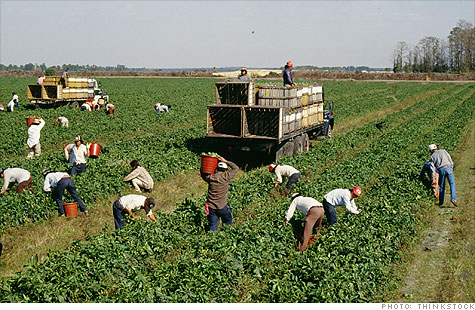The United States’ food system depends on a group of people who receive some of the fewest benefits and protections in American labor: migrant farmworkers. Every year, 2-3 million laborers perform agricultural work throughout the U.S., traveling and living in temporary housing. According to the U.S. Bureau of Labor Statistics, agriculture is one of the most dangerous industries in the nation, subjecting its workers to heat stress, long hours, equipment injuries, and toxic chemical injuries. For their work, 75% of migrant farmers earn less than $10,000 annually.
Three quarters of all farmworkers in the U.S. are foreign born. They come to America to escape frequently dehumanizing conditions in their home countries. My friend Josh tells the story of living in Mexico and seeing the living conditions of farmers working in a big name-brand plantation: “The company-provided housing was little more than dirt floors, stick frames, and black plastic covering. Families of three to eight people would sleep in these 8′ x 8′ rooms with little protection from the rain, cold, heat, or exposure.” And these workers were regularly exposed to toxic chemicals because airplanes would spray pesticide while they were in the field.
But too often migrant farmers flee utter deprivation only to enter into exploitation. In the U.S. it’s common to be paid pennies for each pound of crops harvested, in part because the law excludes agricultural workers from the right to join trade unions, which keeps wages artificially low. Add to that the threat of deportation for many immigrants if they complain about wages, conditions, or benefits—to say nothing of intimidation, illegal wage manipulation, or debt bondage—and you have some of the least empowered laborers in the American workforce.
As a 25 in Change Advocate, I’m often mindful of the “least of these”: the thousands of children who get to eat because of our Partners’ donations, as well as the billions of people who are malnourished. But I don’t often think of the migrant farmworkers who are paid so little so that I can eat cheaply and conveniently. Eating only rice and beans means I don’t have the physical or mental energy I’m accustomed to, and I find myself looking at Day 26 as a time to get back on my game at work. And then I think of the men, women, and children working seasonally, transiently, and very, very hard. And I realize they are the “least of these” too.

